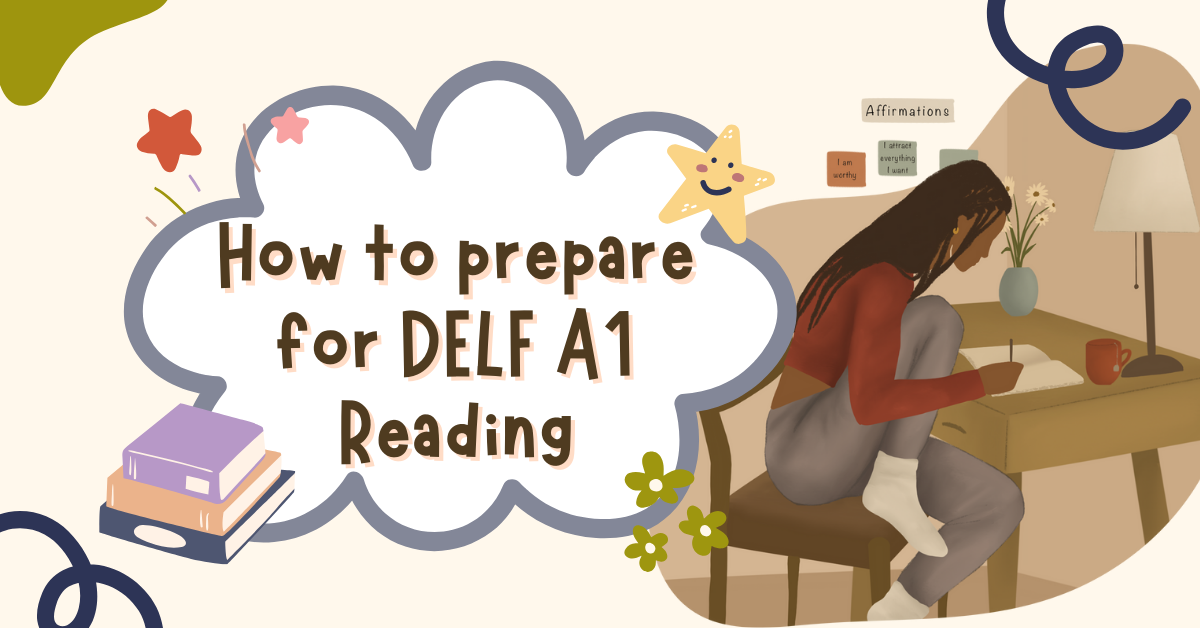Bonjour et bienvenue, aventurier(e) des langues! Your quest for conquering the DELF A1 reading test begins, and the first hurdle is the reading test.
Don’t sweat it! We’ll transform you into a master detective, ready to unveil the secrets hidden within French texts.
What is the exam format and the time allotted?
- Number of sections: The reading test is actually one separate section within the full DELF A1 exam.
- Time allotted: You’ll have 30 minutes to complete the reading test.
- Number of texts: You’ll encounter 4-5 short written documents on everyday topics like menus, emails, brochures, advertisements, or simple news articles.
- Question types: There will be various question types to test your understanding of the texts, including:
- Multiple choice: Choose the best answer from several options.
- Fill-in-the-blanks: Complete sentences with missing words or phrases from the text.
- Matching: Link concepts or information from the text to corresponding options.
- Short answer: Briefly answer questions based on the text using your own words.
What do you need to do?
- Read each text carefully and attentively.
- Understand the main ideas and key information conveyed in each text.
- Pay attention to specific details mentioned in the texts.
- Use your understanding of vocabulary and grammar to answer the questions correctly.
- Don’t panic if you encounter unfamiliar words. Try to use context clues to understand their meaning or focus on the overall message without getting stuck on every detail.
Remember:
- The focus of the reading test is on your ability to understand everyday written French, not on perfect grammar or vocabulary knowledge.
- Manage your time effectively, allocating appropriate time to each text and question.
- Read each question carefully and underline relevant keywords in the texts to help you find the answers.
What types of questions can be asked?
While the exact questions on the DELF A1 reading test vary depending on the specific exam session, here are some common types of questions you might encounter:
Understanding the Main Idea:
- What is the main topic of the text?
- What is the author’s purpose in writing this text?
- What is the overall message or impression conveyed by the text?
Identifying Key Information:
- Who are the people mentioned in the text?
- Where and when does the event described in the text take place?
- What are the specific details mentioned about a particular product, service, or event?
Understanding Details:
- What does a specific word or phrase mean in the context of the text?
- What is the relationship between two characters or things mentioned in the text?
- What is the cause or effect of a specific event described in the text?
Drawing Conclusions:
- What can you infer or conclude based on the information provided in the text?
- What might happen next based on the events described in the text?
- What is the author’s opinion or judgement on the topic discussed in the text?
Matching and Ordering:
- Match the names of people in the text to their corresponding descriptions.
- Put the events mentioned in the text in chronological order.
Applying Information:
- Using the information provided in the text, answer a question about a real-life situation.
- Choose the best option to complete a sentence based on the information in the text.
How to Prepare?
Here are some free resources you can use to practice for the DELF A1 reading test:
Websites:
- France Education International: The official website of the DELF exam offers free sample tests, practice exercises, and information about the exam format and scoring.
- Kwiziq French: Offers a variety of free DELF A1 practice exercises, including reading comprehension, listening comprehension, writing, and speaking.
- TV5Monde: Allows you to take tests to practice.
- Bonjour de France: Variety of free resources for learning French, including reading comprehension exercises, vocabulary lists, and grammar lessons.
YouTube channels:
- Learn French with Alexa: This YouTube channel offers a variety of short and engaging videos on French grammar, vocabulary, and culture, including videos specifically designed for beginners.
- French with Vincent: This YouTube channel offers a variety of videos on French grammar, vocabulary, and culture, including videos specifically designed for DELF A1 preparation.
Apps:
- Duolingo: This free app gamifies learning French, with a variety of exercises to help you learn vocabulary, grammar, and reading comprehension.
- Memrise: This free app uses flashcards and spaced repetition to help you learn French vocabulary.
- Anki: This free app allows you to create your own flashcards for vocabulary, grammar, or any other topic you want to study.
Other Resources:
- Local libraries and bookstores: Many libraries and bookstores have books and other resources for learning French, including practice tests and sample questions for the DELF A1 exam.
- Language exchange partners: Finding a language exchange partner can be a great way to practice your French conversation skills and get feedback on your reading comprehension.
- French films and TV shows: Watching French films and TV shows can be a fun and engaging way to improve your listening comprehension and learn new vocabulary.
- Read written French: Spot French words everywhere! Read articles about your interests, listen to catchy songs, watch funny videos… The more immersed you are, the faster you’ll crack the code.
- Get familiar with texts: ️DELF A1 texts often involve everyday situations: menus, brochures, emails, ads, etc. Get familiar with these types of texts beforehand to avoid surprises on the big day!
- Practice reading comprehension exercises: Read each line carefully, then answer questions calmly. Often, the answers are hiding right in the text!
- Don’t be afraid to call for backup: Stuck on a word? Ask your teacher, a bilingual friend, or use an online dictionary. Every conquered word is a victory!
- Turn learning into a game: ️Play French word games, create stories from pictures, do quizzes with friends. Learning with fun is the best way to progress!
Bonus Tip:
Focus on the overall meaning, not every unknown word. Sometimes, you can grasp the idea even if you don’t know everything.
Remember:
- DELF A1 tests your ability to understand everyday French, not perfect grammar.
- Read each text calmly, multiple times if needed.
- Underline key words and important information.
- Don’t be afraid to skip an unknown word if you still understand the meaning.
- Most importantly, keep smiling and have fun!
With a little preparation, curiosity, and a sprinkle of courage, you’ll unlock the secrets of the DELF A1 reading test in no time!
Good luck, and remember… “Progress never stops!”
Optimize your approach to the DELF A1 examination by focusing on the key aspects:





